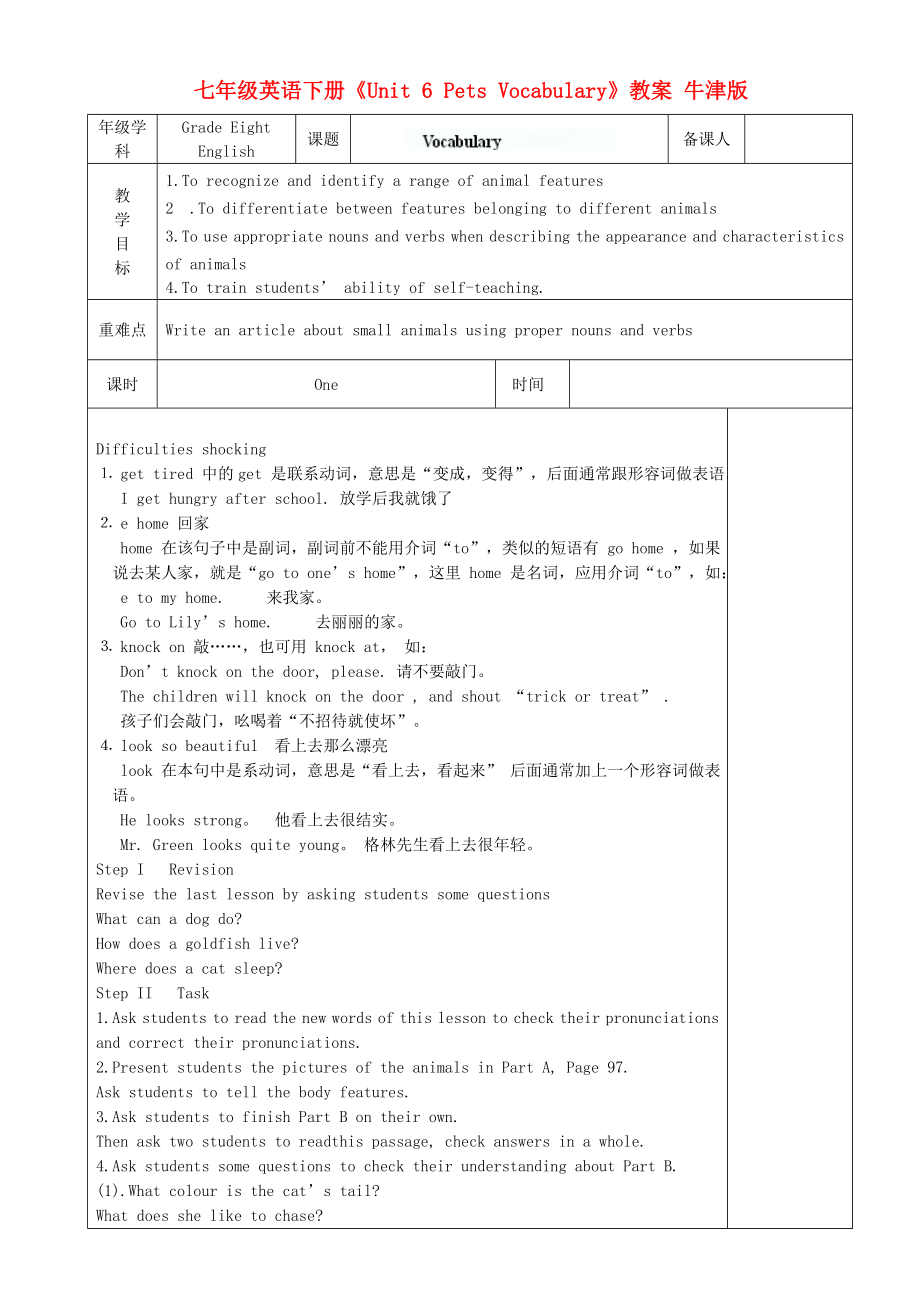《七年級(jí)英語下冊(cè)《Unit 6 Pets Vocabulary》教案 牛津版》由會(huì)員分享�,可在線閱讀,更多相關(guān)《七年級(jí)英語下冊(cè)《Unit 6 Pets Vocabulary》教案 牛津版(2頁珍藏版)》請(qǐng)?jiān)谘b配圖網(wǎng)上搜索�。
1、七年級(jí)英語下冊(cè)《Unit 6 Pets Vocabulary》教案 牛津版
年級(jí)學(xué)科
Grade Eight
English
課題
備課人
教
學(xué)
目
標(biāo)
1.To recognize and identify a range of animal features
2?.To differentiate between features belonging to different animals
3.To use appropriate nouns and verbs when describing the appearance and characteris
2�����、tics of animals
4.To train students’ ability of self-teaching.
重難點(diǎn)
Write an article about small animals using proper nouns and verbs
課時(shí)
One
時(shí)間
Difficulties shocking
⒈ get tired 中的get 是聯(lián)系動(dòng)詞��,意思是“變成��,變得”�����,后面通常跟形容詞做表語�。
I get hungry after school. 放學(xué)后我就餓了
⒉ e home 回家
home 在該句子中是副詞��,副詞前不能
3��、用介詞“to”,類似的短語有 go home �,如果說去某人家,就是“go to one’s home”�����,這里 home 是名詞�,應(yīng)用介詞“to”,如:
e to my home. 來我家�。
Go to Lily’s home. 去麗麗的家。
⒊ knock on 敲……�����,也可用 knock at��, 如:
Don’t knock on the door, please. 請(qǐng)不要敲門�。
The children will knock on the door , and shout “trick or treat” .
孩子們會(huì)敲門,吆喝著
4��、“不招待就使壞”��。
⒋ look so beautiful 看上去那么漂亮
look 在本句中是系動(dòng)詞�,意思是“看上去,看起來” 后面通常加上一個(gè)形容詞做表語��。
He looks strong。 他看上去很結(jié)實(shí)�。
Mr. Green looks quite young。 格林先生看上去很年輕��。
Step I Revision
Revise the last lesson by asking students some questions
What can a dog do?
How does a goldfish live?
Where does a
5�����、 cat sleep?
Step II Task
1.Ask students to read the new words of this lesson to check their pronunciations and correct their pronunciations.
2.Present students the pictures of the animals in Part A, Page 97.
Ask students to tell the body features.
3.Ask students to finish Part B on their ow
6�����、n.
Then ask two students to readthis passage, check answers in a whole.
4.Ask students some questions to check their understanding about Part B.
(1).What colour is the cat’s tail?
What does she like to chase?
Where does she sleep?
What does she do when she is hungry?
(2).What colour is the pa
7��、rrot?
What does he do when his master es home?
Does he knock on the cage when he is full?
Step III Writing
1.Ask students to read the passages again and try to find out what does each passage talk about.
a, appearance ( colour, paw, tail, feather, etc.)
b, characteristic ( what they eat/dr
8�����、ink, what they do, etc.)
2.Divide the students who wants to write the same kind of animal into one group. In groups, students talk about what they want to write about.
3.Ask students to write their positions. They have to write at least ten sentences, including the appearance and characteristics o
9��、f this kind of animal.
4.Students write their passages. If they don’t know the words they want, they can use a dictionary or ask the teacher for help.
5.Ask several students to show their positions for the class.
6.Set an evaluation on students’ work. Encourage them to write their own passages.
10�、StepIV Exercises
I.用動(dòng)詞的適當(dāng)形式填空
⒈ your sister (go) to school by bike every day?
⒉ Where Jill (e) from ?
⒊ Don’t (talk) in class.
⒋ They want (see) Uncle Wang today.
⒌ He (like) (watch) CCTV news in the evening .
II.選擇題
( )⒈ There’s some
11�����、thing wrong my puter.
A. on B. of C. with D. at
( ) ⒉ My cat a black and white tail.
A. have B. has C. there is D. there
( ) ⒊ My parrot is special food.
A. very a B. a quite C. a very D. very
( ) ⒋ My father was c
12、ooking supper when I .
A. got home B. got to home C. e home D. e to home
( ) ⒌ My parrot’s feathers look so nice the sun.
A. under B. between C. into D. i
Vocabulary
What does she like to chase? Where does she sleep?
板書設(shè)計(jì)
教學(xué)反思
 七年級(jí)英語下冊(cè)《Unit 6 Pets Vocabulary》教案 牛津版
七年級(jí)英語下冊(cè)《Unit 6 Pets Vocabulary》教案 牛津版

